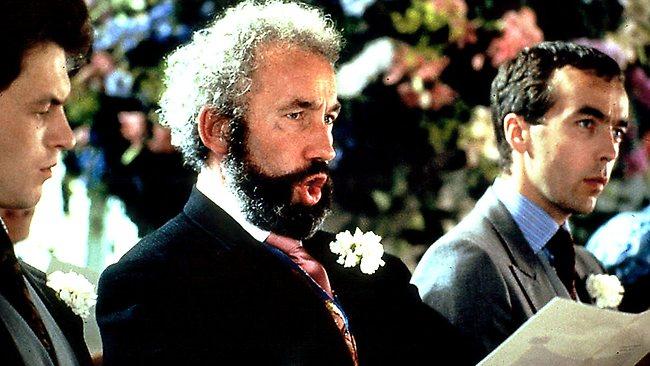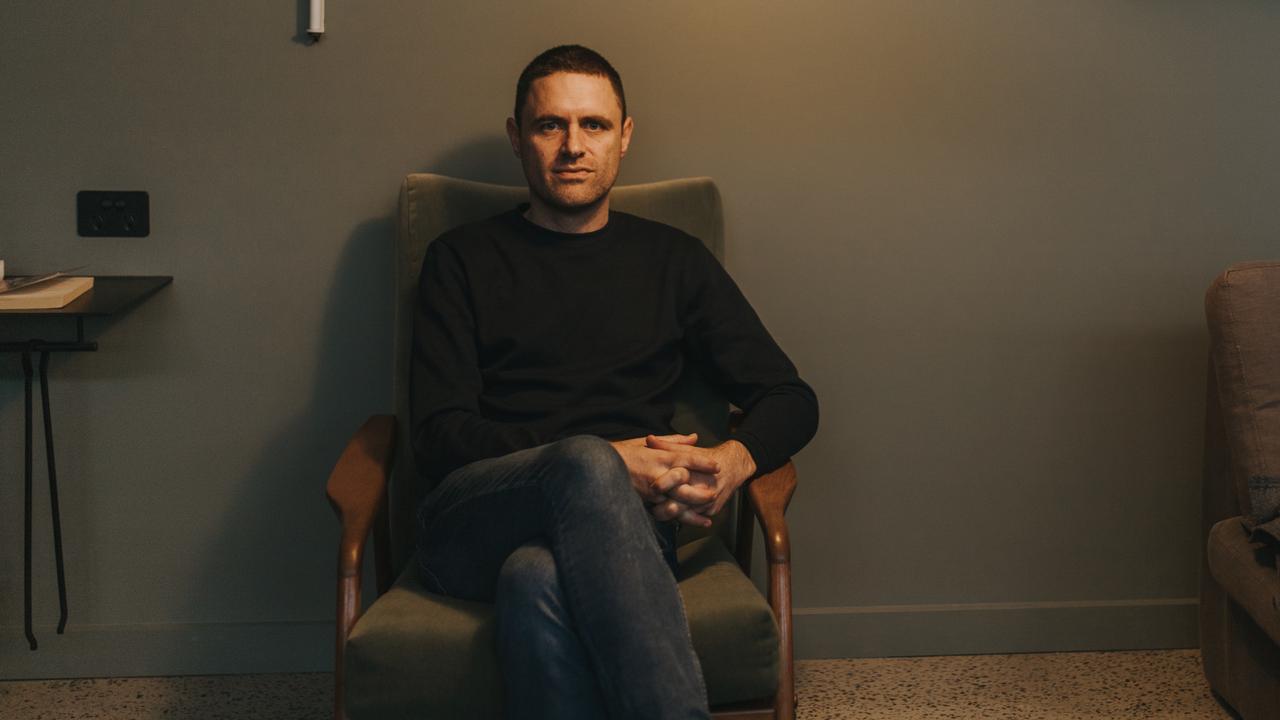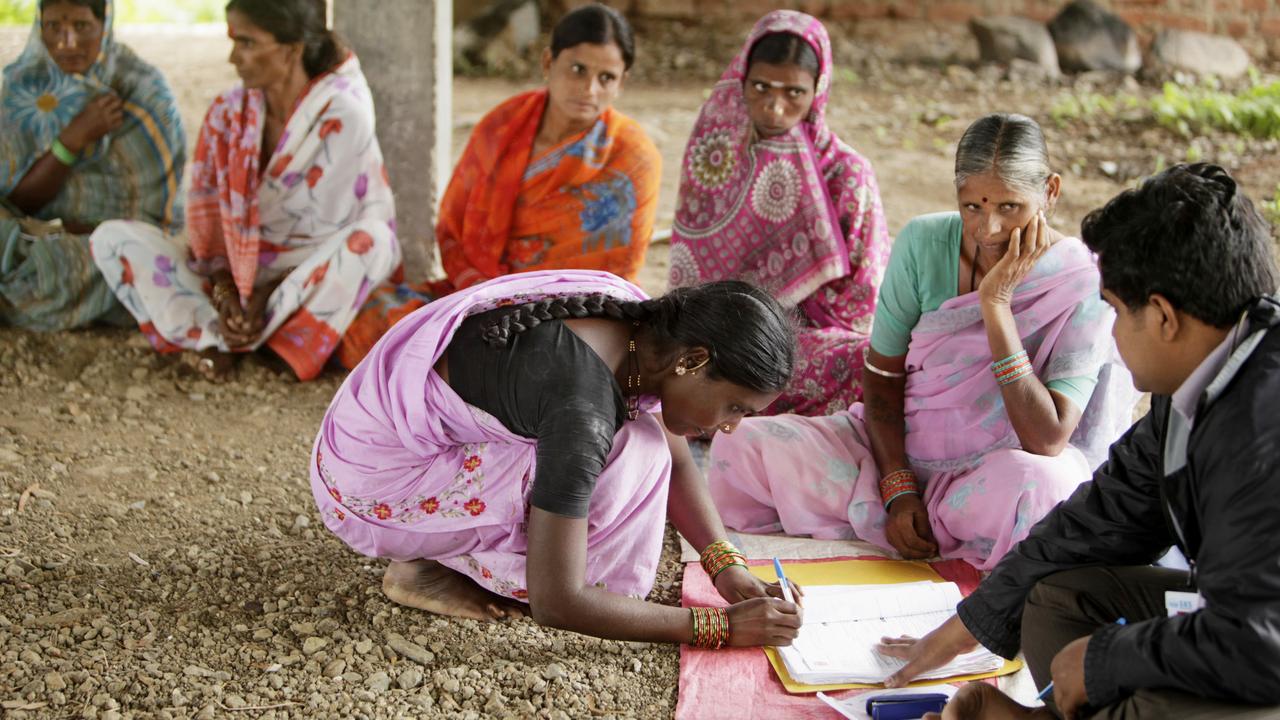Worldly wise Simon Callow heads to the Melbourne Writers Festival
SIMON Callow is an inspired choice to headline next month's Melbourne Writers Festival.

AS I make my way to the private members' club at London's Ivy restaurant for a rendezvous with Simon Callow I list his achievements: alongside an illustrious career on stage and screen of almost 40 years, he has written 13 books, including biographies, memoirs and explorations of the actor's craft; he has directed plays, operas and musicals and recently been a judge on the successful if cheesy British reality television show Popstar to Operastar.
He also has cornered the market in one-man shows about two of the giants of English literature, Shakespeare and Dickens.
The club at the Ivy is heaving with film and theatre folk, and a pianist tinkles 30s tunes in keeping with the art deco interior. Callow enters unobtrusively, dressed in black, younger-looking than his 63 years, carrying a copy of Byron's collected works; a new one-man show? He's not saying.
Our conversation is immediately chatty, intimate, rich with anecdotes (his), warm laughter and dramatic delivery (again his). His famous voice is rich and fruity, pitched low but easily audible beneath the Ivy hubbub.
He loves clubs, he explains, and belongs to several, but has just been away for a couple of weeks on Mykonos, which was gorgeous.
It's past six and a handsome waiter glides to our table. "Is it too early to have a drink?" he asks. The waiter thinks not.
"Do you have any Greek wine?" The waiter laughs. No sir, nothing Greek.
"Oh well, a Chianti then," he decides, before launching into an anecdote that manages to knit Greece and Italy together, a riff about a potentially disfiguring motorbike accident he had on Crete in 1984 just before the start of filming for A Room with a View in Tuscany. It's an insight into how his mercurial mind flits around, linking up ideas through word associations, creating a compelling narrative from scraps of talk.
His twinkling, skinny-dipping Reverend Mr Beebe remains one of his best-known film roles, alongside Gareth in Four Weddings and a Funeral. The latter was a marvellous script, he says, and even though, as a gay man, he guessed the part he'd been earmarked for - "I said to a friend before opening it, 'I bet I'm the funeral' " - he still marvels at the worldwide success of such a quintessentially English film. "It was popular in Japan. In Tahiti! That's a chemical thing that happens and it doesn't happen very often," he says.
You can tell if a script is good, he continues, but not if the film will be a hit. His latest film role hams it up as a restaurant critic in Love's Kitchen. Starring Dougray Scott and with a cameo from Gordon Ramsay, it was panned by the critics.
"Disastrous!" he says with a laugh, adding a "how can you tell if it will be any good" shrug. "It was a harmless little film. Why they descended like that is mystifying."
He's not particularly bothered by the custard pies in his film career, however, because everything else has been going so well. Having spent part of 2009 in Sean Mathias's production of Beckett's Waiting for Godot alongside Ian McKellen, Patrick Stewart and Ronald Pickup, he moved on to preparing his new one-man show, Being Shakespeare by Jonathan Bate. After a national tour in 2010, it has been back in the West End this year as well as having runs in New York and Chicago.
His collected theatre journalism My Life in Pieces, published last year, was enthusiastically received and he's about to head to our shores to talk about his latest book, Charles Dickens and the Great Theatre of the World.
This year is the bicentenary of Dickens's birth and Callow has a robust pedigree in the Dickens industry. In 2003 he wrote Dickens' Christmas, an exuberant study of the annual celebration that Dickens made famous in A Christmas Carol, and he has been playing the great writer in various guises for years on stage, screen and television, including in two episodes of Doctor Who.
His previous visit to Australia in 2002 was for a tour of The Mystery of Charles Dickens, a theatrical version of the writer's life written by Peter Ackroyd. That show and performances of Dr Marigold and Mr Chops, two monologues by Dickens, have been remounted several times, the latter attracting gushing reviews including one from Michael Billington in The Guardian that contained the phrase "unalloyed Dickensian joy".
Callow says he relishes the grotesqueness and pathos, the rich comedy and acute perceptiveness of Dickens's world as well as his astonishing life story.
"He's one of the most remarkable men ever to walk the earth," Callow says, and although he protests that it would be insanely presumptuous to claim any identification with Dickens, he nevertheless does. "I have quite an advanced sense of fantasy, as Dickens did, and I'm very industrious, but not as industrious as Dickens was, of course. No one ever was. But I understand his passion, an ardour to perform, the longing for life to be at a kind of pitch all the time."
Alongside his headline spot at the Melbourne Writers Festival and a gig at the Sydney Opera House, Callow will also be appearing in Ballarat. Two of Dickens's sons lived in rural Victoria, although their father never visited, and in Callow's assessment Dickens "disposed" of them, saying: "You haven't any talent for anything so I suppose Australia's the best place for you."
He guffaws. Oh yes, Dickens was flawed, he says, especially in his personal relationships, but his greatness far outweighs the faults.
Will he catch up with his old friend Miriam Margolyes? She lives in Australia and her solo show Dickens' Women has toured worldwide. Have they ever thought of teaming up? Another roar of laughter. "We are mindful of how each other's career is faring," he responds and, yes, there have been speculations about the possibility of a show featuring one half of his material, one half of hers. Given they both do versions of alcoholic nurse Mrs Gamp, there could be a clash of mob caps.
"It would be a pretty rich palette," he concedes, though she's "terribly good".
Despite his obvious enthusiasm for the creator of Mr Pickwick and Scrooge, it still comes as a shock when he says he wrote Dickens and the Great Theatre of the World, a work of about 350 pages, in four weeks.
Four weeks? Callow is breezy; oh yes, he says, he'd done a great deal of reading "and it doesn't pretend to be a work of original scholarship, it's a kind of 'meet Charles Dickens' book; There were lots of 'Charles Dickens as I knew him' books from the 19th century and this is mine."
Publisher HarperCollins got in touch in January last year to commission a short volume and he said yes.
"I often take things on quite lightly and then suddenly realise what a vast amount of work is involved," he says. "I knew it was going to be Dickens on the stage of life as a public performer because he was a performer in everything he ever did, but by the time I'd finished four weeks I had written the 180 pages [agreed upon] and three times more."
It's a well-known fact, says Callow, that Dickens could have become an actor; as a young man he cancelled an audition at London's Drury Lane Theatre because he had a cold and before he could organise another his career as a journalist had taken off and his destiny was set.
Although a fanatical organiser and actor in amateur dramatics, it wasn't until his 40s that he started his famous readings, starting with A Christmas Carol. His performances were so compelling that this became a second career, with tours across Britain and to the US bringing him rock-star status. On stage, without props, he became David Copperfield or Fagin, but it has become part of the Dickens legend that the strain of these nightly appearances, which included the gruesome enactment of Nancy's murder in Oliver Twist, contributed to his death at 58.
Would Dickens have made a great playwright? No, says Callow. In fact, he was terrible. "The reason I've given is that he was so utterly besotted with the theatre of his own time, so stagestruck that he just reproduced it." He wouldn't have been happy with the life of an actor either, continues Callow, but if he had learned theatre from the inside he might have become, like Moliere or Shakespeare, a great dramatist.
Callow has never been content to wait for an agent's call or sit in thrall at a director's feet, though his first job as a teenager, in the box office of the National Theatre, came about as a result of an ardent three-page fan letter to the NT's artistic director Laurence Olivier, telling him what a fine organisation he was running. Callow ended the letter with "it makes one proud to be British", a sentiment he says he meant and one that struck exactly the right tone with the "idiotically patriotic" Olivier.
From the beginning of his career, via Queen's College Belfast and London's Drama Centre, he has been a self-starter, devising shows, writing about theatre, seeking out the great and the good and learning from them. Having ambitions to be a writer and an actor, one of the first teachers Callow encountered was the co-founder of Dublin's Gate Theatre company, dramatist and actor Michael MacLiammoir, whose one-man play about Oscar Wilde, The Importance of Being Oscar, Callow made his own.
If he writes another biography, he says - and he's dying to delve into fiction now - he would write about the relationship between Olivier and Kenneth Tynan, the brilliant, eviscerating and flamboyant theatre reviewer who, in 1963, became the National Theatre's first literary manager and is widely regarded as one of the most influential voices of the post-war British stage.
Callow's debut as an actor in 1973 was in the shadow of Olivier and Tynan's achievements. These were heady times, with greater sexual freedom, plays with gritty themes and productions that plundered ideas and talent from continental Europe.
In the early 1970s Callow was a member of the Gay Sweatshop theatre company (other alumni include Antony Sher and Margolyes) and was one of the first openly gay actors in Britain when the common wisdom was that it would ruin your career.
It didn't, with Callow's big break coming when he was cast in the lead role of Mozart in the 1979 National Theatre premiere of Peter Shaffer's Amadeus (he later played impresario and Magic Flute librettist Emanuel Schikaneder in the film version).
Far more controversial than being gay was his attack on the autocracy of directors in his 1984 book Being an Actor: "It was an irony not unobserved that the moment the book was published with its manifesto against directors I became a director," he says dryly.
His forays in that arena have been a mixed bag; an adaptation of the film Les Enfants du Paradis for the Royal Shakespeare Company didn't fare well, shows including Shirley Valentine, My Fair Lady and Carmen Jones were hits. He has a deep knowledge of classical music, too, and has directed operas, most recently Mozart's Magic Flute for Holland Park Opera in 2008.
When I ask him which directors he'd like to work with, he's momentarily stymied before replying, with a laugh, "they're all dead". In film it would be Bergman or Fellini, he says; in theatre, a cast of "extravagantly interesting directors who were also terribly narcissistic. Although I should be the last person allowed to say this, I miss the monsters of yesteryear - John Dexter, Tyrone Guthrie, Zeffirelli." Franco Zeffirelli's "heavenly" 1967 National Theatre production of Much Ado about Nothing, he says, would be regarded with contempt nowadays for being too voluptuous and joyful.
As his biographies of actor-directors Charles Laughton and Orson Welles testify, Callow has a penchant for highly talented, flawed and flamboyant characters, as colleagues and subjects.
His work on Laughton came from a deep-seated love and admiration for the director of Night of the Hunter, whereas - although he is fascinated by Welles - he says that for all the latter's gifts and energy, his work is not really "nourishing".
Despite dashing off his study of Dickens in a month, Callow's three-decker biography of Welles has been on the boil for 24 years, with one volume still to come.
He never met Welles, who died in 1985, but, unlike his biographies, his works of memoir are all about personal relationships and full of finely observed characters.
One of the most moving and intimate is Love is Where It Falls, an account of his intense 11-year relationship with the larger-than-life theatrical agent Peggy Ramsay, 40 years his senior, whose descent into Alzheimer's marks the final chapters of their friendship. His mother, now 93, is also afflicted with the condition and hasn't recognised him for the past five years. " 'Getting old is not for sissies,' as Bette Davis remarked," he adds.
Although Callow says his ambition now is to lead a life so interesting that someone is compelled to write a biography of him, he still has one memoir left to write, involving the women in his family who shaped him. It is the story of his first 25 years, one he must write, he says, to exorcise a series of "primal and Proustian" scenes from his brain: "It's like a memory haemorrhage, all the time; they are the great figures of my life."
His father left home when Callow was 18 months old and he grew up in a very female environment. His maternal grandmother fostered his fascination for dramatic characters. She was a big woman in every sense, he says, a former chorus girl, and theirs was a very close relationship.
"We felt we were the only people who understood each other." She believed in personalities as "a good in itself, a blessing on the world, an ability to make life exciting, unusual, interesting, and I really bought that".
Callow himself was a "filthy show-off " but wasn't given much encouragement by his mother, who was diligent and strict. She used to say, "Every day you've got to say, 'What have I achieved today?' ", but she was also unreliable, capricious and lacking in what Callow calls a human touch.
The south London suburb of Streatham was not bohemian and apart from pantomime, he didn't see much theatre until his teens, but Callow has recently discovered a rich vein of performing in his ancestry. His Danish maternal great-grandfather was a clown, a ringmaster and finally a London theatrical agent, and his French great-grandmother was a bareback rider.
We're getting to the end of the interview, the waiter has been and gone for a second time and a new tide of scene-stealers has arrived at the Ivy. What are his plans after Dickens? A big tour of his Shakespeare show taking in India, Southeast Asia and Australasia, he says. But then, as he gets up to leave, he adds that there's another man in his life alongside the literary greats, a new relationship with someone outside the theatre world that is heavenly and gorgeous.
"My life is changing. Who knows what will happen?"
Simon Callow delivers the keynote address at the Melbourne Writers Festival, August 23, repeated in Ballarat, August 25. He appears in a performed reading from Dickens and the Great Theatre of the World in Sydney, August 26.


